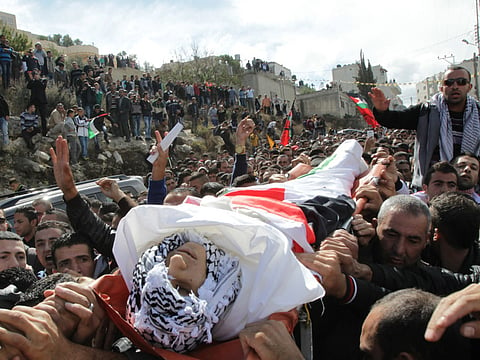Israeli minister wants regime flag to fly over Al Haram Al Sharif
Israel and Jordan say there will be a live Internet stream of footage from Al Haram Al Sharif soon

Occupied Jerusalem: Israeli Prime Minister Benjamin Netanyahu has moved to bring cabinet members into line after a deputy minister said she “dreamed” of seeing the Israeli flag flying over Al Haram Al Sharif.
Deputy foreign minister Tzipi Hotovely said in excerpts from a TV interview to be broadcast on Tuesday that the site was “the centre of Israeli sovereignty, the capital of Israel.”
“It is my dream to see the Israeli flag flying” over Al Aqsa, Islam’s third holiest site, she was quoted by Israeli media as saying ahead of the broadcast on parliament’s cable TV channel.
“We should raise the flag, this is Israel’s capital and it is the holiest place to the Jewish people,” she said. The compound is known to Jews as the Temple Mount.
Netanyahu’s office reacted swiftly with a statement late on Monday recalling his promise to maintain the status quo which allows Muslims to pray at the site, and Jews to visit but not pray there.
“The policy of the Government of Israel regarding the Temple Mount was expressed by Prime Minister Benjamin Netanyahu in his statement Saturday night, and nothing has changed.”
“Prime Minister Netanyahu made it clear that he expects all members of the Government to act accordingly,” his office said in a statement
Palestinians accuse Israel of seeking to change the long-standing practice by which only Muslims are permitted to pray at Al Haram Al Sharif — sacred to both Islam and Judaism — in Jerusalem’s walled Old City.
The comments come as tensions over the site sparked a wave of violence that has seen knife and gun attacks against Israelis, as well as clashes between Palestinians and Israeli security forces.
US Secretary of State John Kerry met Saturday in Amman with Jordan’s King Abdullah II and Palestinian leader Mahmoud Abbas and announced steps to calm tensions, including installing 24-hour security cameras at the site.
Netanyahu then issued a written statement denying any changes in practice were planned.
“Israel will continue to enforce its long-standing policy: Muslims pray on the Temple Mount; non-Muslims visit the Temple Mount,” he wrote.
In stark contrast, Hotovely, from Netanyahu’s right-wing Likud party, told Knesset TV that Jews should be allowed to pray there.
She later issued a statement taking sole responsibility for her remarks.
“My personal opinions are not government policy. I am committed to the policy stated by the prime minister, who declared that we would not change the status quo,” she said.
Meanwhile, Israeli and Jordanian officials said Tuesday that new surveillance cameras should be installed within days at Al Haram Al Sharif, with the goal of streaming the footage live on the Internet for maximum transparency.
The idea to install the cameras emerged during separate talks late last week between US Secretary of State John Kerry and the three sides with a stake at the shrine - Israel, Jordan and the Palestinian self-rule government. Kerry was looking for a way to lower tensions, but it’s not clear if video cameras will suffice.
The surge in violence has prompted an intense diplomatic drive to douse tensions that many fear herald a third Palestinian intifada.
Palestinian president Mahmoud Abbas met European Union foreign policy chief Federica Mogherini late Monday in Brussels in the latest effort to calm the crisis.
Abbas repeated his criticism of what he said was Israel’s “non-respect” for the rules at the Al Aqsa mosque compound.
Netanyahu, who has vowed not to change the status quo, has accused Abbas of inciting the violence by making such accusations.
“The situation in Palestine is extremely serious and grave and may even deteriorate. This is my fear,” Abbas said.
“The main reason is the feeling of disappointment (among) the young generation,” who feel there is “no hope,” Abbas said.
Many of the youths leading the unrest were born under Israeli occupation, and see no way out, with a moribund peace process offering them little hope of achieving their dream of a Palestinian state.
Sign up for the Daily Briefing
Get the latest news and updates straight to your inbox



